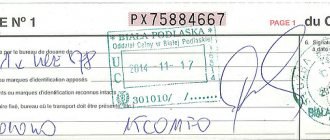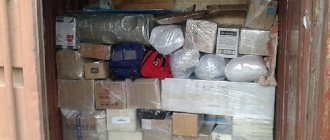Home \ Import and customs clearance of cigarettes and tobacco products
Tobacco products, which include many varieties (cigarettes, cigars, hookah and pipe tobacco, chewing tobacco, snuff) require compliance with a number of rules and regulations.
Customs clearance and transportation of tobacco goods, including cigarettes, is carried out in a special way. The declarant needs to understand the specifics of the legislation, so suppliers usually resort to the help of customs brokers during transportation and clearance.
Subtleties of customs clearance of cigarettes and tobacco
Tobacco itself and products made from it require special storage and transportation conditions; packaging must be made of moisture-resistant material.
All tobacco is excisable products. Declaration of such cargo is carried out at excise customs.
When transporting tobacco goods internationally, excise duty is paid separately and special excise stamps are placed on the packaging.
Transporting tobacco cargo across the border is many times more difficult than customs clearance of goods such as chemicals or food products. Considering this fact, you cannot do without the help of a customs broker.
Transporting tobacco in airplane luggage
To transport tobacco in luggage, it would be a good idea to inform customs officers about this upon boarding, before the flight. The rules for transporting baggage are similar to the rules for transporting hand luggage, so they are regulated by the legislation of the country to which the tourist is going to fly. The quantity of goods transported is the same, so no more can be transported.
First of all, citizens must be familiar with all flight rules. They themselves must take a responsible attitude towards existing requirements and prohibitions and not violate them.
Features of customs clearance of cigarettes
To sell tobacco imported into the Russian Federation, a license is required.
Documents required to obtain a license:
- statement from the company
- company location address
- passports of all founders
- company account number
- tax statement
- payment order (fact of payment for the license)
- documentation for the product, which confirms its quality.
The determination of customs duties directly depends on the correctly selected code of the foreign trade product nomenclature.
All tobacco products belong to the 24th commodity group of the Commodity Nomenclature of Foreign Economic Activity and are processed exclusively at posts that belong to the excise customs department.
From January 1, 2021, excise taxes were imposed on electronic cigarettes and vape liquids. Previously, the excise tax applied exclusively to disposable e-cigarettes.
After paying the excise duty, the packaging of tobacco products is marked by affixing a special excise stamp.
Tobacco cargo arrives at customs already marked, so payment of excise duty and receipt of stamps occurs in advance, before transportation begins.
Main stages of transportation
Before ordering road transportation services or developing a logistics scheme, the customer must obtain a license for excisable goods. The document is issued by the Ministry of Taxes and Duties of the Russian Federation.
Procedure:
- Application for receipt - provide a commercial account number, company address, passport of the responsible person (general director, founder), indicate the validity period of the license.
- Submit documents for verification - fact of registration of a company, individual entrepreneur, LLC, paper confirming payment of taxes, quality certificates for transported goods.
- Certificate of payment for the license.
The owner of tobacco products is required to obtain a declaration that will confirm that the batch complies with the technical regulations. Samples are submitted to an independent laboratory for testing and the amount of nicotine, tar, and carbon dioxide is determined. If the standards are exceeded, they will not issue paper for excisable goods and cannot be transported.
You can receive a tax stamp. It is issued by the customs service. Cannot be obtained unless tax due is paid.
Having all the documents, you can order the service of transporting tobacco products. Transportation is divided into several stages:
- Loading containers into a container or truck. A company representative controls how boxes of tobacco or derivatives, cigarettes, are stacked. Checks the presence of climate control equipment that stabilizes temperature and air humidity.
- Transportation of cargo - together with the driver, a representative of the supplier’s company is sent on the route, who has complete information about the shipment and has accompanying documents. If delivery involves crossing the border, a translator is needed.
- The first check of goods at customs is an audit of documentation, inspection of the consignment in a container or truck, the presence of excise stamps. But it will not be possible to clear customs immediately at the checkpoint.
- The second check and final customs clearance takes place at the regional or central customs office. It is necessary to clarify the location in order to develop a short route. “Purified” goods are legally admitted for sale in Russia or another country.
- Delivery to the client to the warehouse or to the specified address.
The transportation scheme for cigarettes may vary depending on the fact of crossing the border. Excise taxes are paid in any case.
Standards for transporting tobacco products for personal use:
Type of product Carriage allowance for cigars < 50 pcs. tobacco < 250 g. cigarillos < 100 pcs. cigarettes < 200 pcs.
If tobacco products transported by an individual exceed the specified standards, then the goods are subject to declaration. In this case, payment of the duty is inevitable.
It is important to know! Only persons over 18 years of age have the right to transport cigarettes and tobacco products. Many people violate these rules, which leads to the payment of a fine for violating the law and the confiscation of goods.
Smoking on a plane
In any country in the world it is prohibited to smoke in transport, especially in the cabin of an airplane. Any smoke will be immediately known to the security system, and hiding in the toilet to smoke a cigarette will not be possible.
Passengers are usually fined for violating flight rules. The strictest rules have been adopted in Saudi Arabia, the UAE and other Eastern countries.
For smoking on board an airliner in these countries, fines are so large that they exceed the cost of an air ticket several times. A passenger caught smoking is subject to additional testing for the presence of drugs in his body. This also applies to e-cigarette lovers.
Transportation of tobacco products. Peculiarities
Absolutely all tobacco products have one important feature - excessive absorption of moisture and foreign odors. For this reason, the transportation of tobacco products and, for example, food products in the same cargo container is prohibited.
Transportation of tobacco products can be carried out using absolutely any type of transport. This can be transportation by rail, transportation by air, transportation by sea and by road.
Tobacco cargo is not delivered by sea and rail very often. In most cases, road transport is used.
Tobacco or cigarettes are packaged in separate cardboard packs with a foil layer inside. Elite varieties of tobacco products are packaged in wooden cigarette cases. The packs are assembled into blocks, which are covered with polyethylene film, and the blocks are already folded into cardboard boxes. The blocks inside the boxes are sorted by type of tobacco or cigarette to avoid mixing different tastes and smells. Each package is marked.
When transporting tobacco, vans or containers must be exclusively covered so that water and dirt do not affect the quality of the product.
The material from which boxes for transporting cigarettes are made should be of medium hardness. Otherwise, the lower boxes will be damaged under the influence of the upper ones.
The packaging must include a warning about the dangers of smoking.
Age limit
Don't forget about the carrier's age limit. It has been determined that the use and transportation of tobacco products in the Russian Federation is permitted only upon reaching adulthood. If we take foreign countries for comparison, the age of the passenger in them is approximately the same.
In some countries, cigarette use is allowed from the age of 16, for example, Bulgaria. Many countries, such as Japan and the USA, have increased the smoking age to 20 years. The exception is Egypt, where smoking is available from adolescence - 15 years.
Labeling of cigarettes and tobacco products
Mandatory labeling of tobacco products was introduced on July 1, 2020. Tobacco products are labeled by applying a two-dimensional code. The code name is DATAMATRIX. This digital cipher is protected by cryptographic technologies.
To carry out labeling, the supplier must register on the Honest Sign website. In addition, without a valid electronic signature and software installation, marking is impossible.
It is important to know! Fines for selling unlabeled cigarettes are: - for individual entrepreneurs: up to 10,000 rubles - for legal entities. persons: up to 300,000 rubles In both cases, the goods are confiscated.
There is also criminal liability (up to 3 years in prison) for the sale of unlabeled tobacco products if the cost of the counterfeit exceeds 1.5 million rubles.
How many cigarettes can be transported in trucks?
There are different batches, but transporting several blocks at a time is unprofitable. So, how many boxes of cigarettes are there in a truck? About 940 packs. How many packs of cigarettes are in a standard 20-ton truck? About 470 thousand. You need to understand that a regular pack holds about 20 cigarettes. Therefore, a loaded semi-trailer will fit more than 9 million cigarettes.
Transporting a large batch at once is much cheaper. But it is important to fully comply with the conditions of transportation and complete all documents correctly.
What applies to nicotine-containing products
The labeling of nicotine-containing products is regulated by Decree of the Government of the Russian Federation No. 2273 of December 25, 2021. This includes goods with the EAEU HS code 2403 99 900 9.
Products with OKPD code 2 are subject to marking:
- 12.00.19.100 and 12.00.19.900 - sticks for Iqos, Glo, Ploom and others. These are products containing nicotine and tobacco, consumed by heating in special devices;
- 12.00.19.900 - smoking mixtures for hookahs that do not contain tobacco. These are special mixtures of tea leaves, as well as cream pastes for hookah devices containing nicotine.
What's prohibited
Before loading a trailer with tobacco products, make sure that the documents comply with the rules. There will be serious problems at the border if you do not have a declaration or agreement with the buyer.
The import of tobacco products without excise tax is prohibited - such goods are considered contraband. At best, you will be given a fine, at worst, your cargo and trailer will be confiscated, and the driver will end up in the dock.
It is prohibited to transport “surprise” cigarettes. Remember that at the border the trucks are “inspected” by service dogs. If a sensitive nose detects even a pack of the entire batch containing the easiest drug, a prison sentence is guaranteed. In this case, the driver will be responsible.
Tips for drivers
Transportation of cigarettes.
We found out how many packs of cigarettes are in the truck, but it’s not worth filling the car to capacity in pursuit of profit.
The cargo is delicate and if it is dented, the losses will be many times greater.
- Before transportation, enter into a supply contract with the sender. This will help avoid unnecessary questions from inspectors.
- Make sure you obtain a warranty for the product and take a certificate of conformity. Check how many boxes of cigarettes are included in the truck.
- If an accompanying person is not provided, remember: all responsibility for the goods will fall on you.
- The recipient will wait for the cargo at a strictly agreed time. If force majeure occurs along the way, be sure to notify the supplier and buyer about it.







